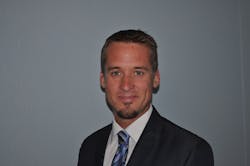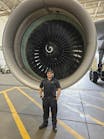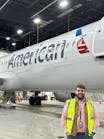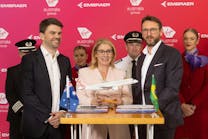From a young age Jay Scott was interested in aircraft/aviation and technology/mechanics. It was a natural career path for him to follow.
Scott started his career at 16 in the general aviation sector. He learned the basics of aircraft servicing and maintenance before securing a four-year degree at Brooklands Technical College of London and Air Service Training (EASA Part 147 approved aviation training school) combined with an apprenticeship with the UK's then second largest carrier. Upon completion of the course he was awarded the necessary license to certify aircraft for flight. He moved on to another UK-based carrier where he worked as a certifying technician and obtained type ratings on several large transport category aircraft. He was responsible for maintenance including airframe and avionic defect troubleshooting and rectification. Then he was offered the opportunity to move to the United States and work as part of the overseas maintenance management team. Responsibilities included management of aircraft maintenance operations, safety and compliance as well as contract acquisition and management.
Advanced training includes aircraft type ratings taught by Virgin Atlantic, British Airways and Cathay Pacific. He has taken 11 aircraft type training classes along with Swire Management Group Transformational leadership programand LEAN training.
In Scott's current role at Cathay Pacific he is responsible for the maintenance and engineering operation on the west coast of the U.S. and central America. This includes management of staff, operations, out of service aircraft as well as financial responsibilities. He has worked to change the direction of ports under my control and has applied LEAN philosophies. Since beginning in this role he increased profit and productivity as well as reduced waste. This has resulted in a reduced operation cost by approximately 40 percent. He belongs to the Royal Aeronautical Society of Great Britain.
Nominated by Scott Diaz, director of business development, FEAM: Jay laid the foundation for his career in the mid-2000s by studying at two of the UK's leading aircraft maintenance colleges and obtaining licenses issued by EASA and the UK CAA. From there he began working his way up from mechanic to certifying engineer before moving to the US to take his first management position at only 26 years old. One particular campaign resulted in his employer at that time benefiting from a total of US$584,000 in one year alone. This was achieved by insourcing scheduled maintenance. Sometimes a false understanding within airline maintenance departments is that third-party revenue keeps costs low. The reality in today's market is not only that the cost of third-party maintenance is so low it is difficult to make a good profit, but also that you are often enabling your competition. Jay applied this theory in evaluating his operations and was able to save more money by insourcing his work than could be made from third-party revenue, with the same manpower. The benefits of this particular project were not only felt by his department but others alike. Maintenance planning engineers were able to release aircraft on routes with fewer constraints and an impact on OTP was also noted. With his modern management technique (mentored/taught by an industry leader) and fresh ideas for aircraft maintenance management, I see Jay climbing higher and higher."
Alan Fillingham, engineering manager at Cathay Pacific Airways, Boston, says, "Jay is a very qualified and experienced engineer and is passionate about keeping pace with new technology and processes. This passion has driven him on numerous occasions to help redefine how we look at our role in aviation and the technology we use. Jay is also committed to passing this experience on to fellow engineers and new mechanics helping to ensure that all have the opportunity to benefit from his experiences."
Scott says he has been very lucky in his field. "I set out to become a licensed certifying engineer," he says. "I have received so many opportunities that have lead me to new goals. I hope to make a positive impact in aviation by creating a value adding maintenance philosophy that will provide safe travel for people and a safe working environment for engineers and mechanics."



